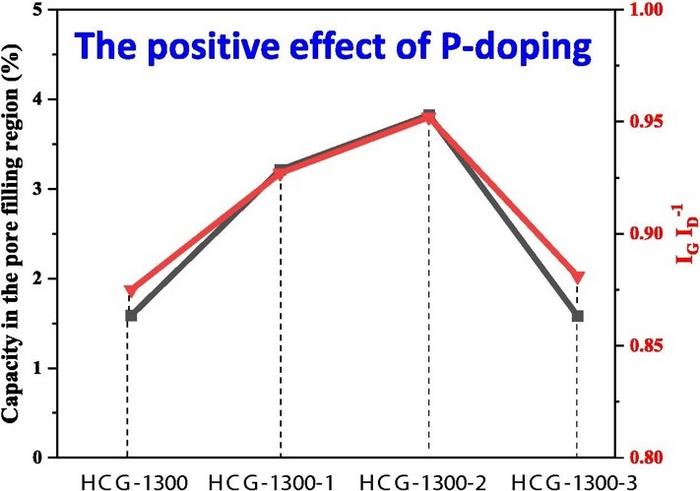In a study recently published in the KeAi journal Carbon Resources Conversion, a team of researchers from Kazakhstan and South Korea reported the successful synthesis of P-doped hard carbon using coffee grounds as a precursor and H3PO4 as the doping agent. The investigation focused on determining the optimal doping level for maximizing the incorporation of phosphorus ions into the carbon framework, aiming to enhance the electrochemical performance of the material as an anode for sodium-ion batteries (SIBs).

Credit: Kalibek, M., et al.,
In a study recently published in the KeAi journal Carbon Resources Conversion, a team of researchers from Kazakhstan and South Korea reported the successful synthesis of P-doped hard carbon using coffee grounds as a precursor and H3PO4 as the doping agent. The investigation focused on determining the optimal doping level for maximizing the incorporation of phosphorus ions into the carbon framework, aiming to enhance the electrochemical performance of the material as an anode for sodium-ion batteries (SIBs).
One notable aspect of the study is the use of coffee waste as a precursor material for hard carbon synthesis. The choice of coffee grounds is not only environmentally conscious, given the large annual disposal of approximately 18 million metric tonnes, but also leverages the unique lignocellulosic structure of coffee waste. This result addresses the challenges posed by the uneven distribution and scarcity of lithium resources, offering an alternative solution through the exploration of SIBs.
The researchers further varied the concentrations of H3PO4, and found that using 2M of the doping agent led to promising electrochemical performance for hard carbon as an anode material. The resulting P-doped hard carbon, carbonized at 1300 °C, exhibited a reversible capacity of 341 mAh g-1 at a current density of 20 mA g-1, with an initial Coulombic efficiency of 83%. These results underscore the potential of P-doped hard carbon in enhancing the energy storage capabilities of sodium-ion batteries.
Overall, the study offers valuable insights into the synthesis and optimization of P-doped hard carbon for sodium-ion batteries, emphasizing the importance of precursor materials, doping agents and carbonization conditions. The findings have implications for the development of more efficient and sustainable energy storage solutions, particularly in the context of sodium-ion batteries.
###
Contact the author: Aishuak Konarov, Department of Chemical and Materials Engineering, School of Engineering and Digital Sciences, Nazarbayev University, Astana, Kazakhstan,
The publisher KeAi was established by Elsevier and China Science Publishing & Media Ltd to unfold quality research globally. In 2013, our focus shifted to open access publishing. We now proudly publish more than 100 world-class, open access, English language journals, spanning all scientific disciplines. Many of these are titles we publish in partnership with prestigious societies and academic institutions, such as the National Natural Science Foundation of China (NSFC).
Journal
Carbon Resources Conversion
DOI
10.1016/j.crcon.2024.100225
Method of Research
Experimental study
Subject of Research
Not applicable
Article Title
From food waste to high-capacity hard carbon for rechargeable sodium-ion batteries




